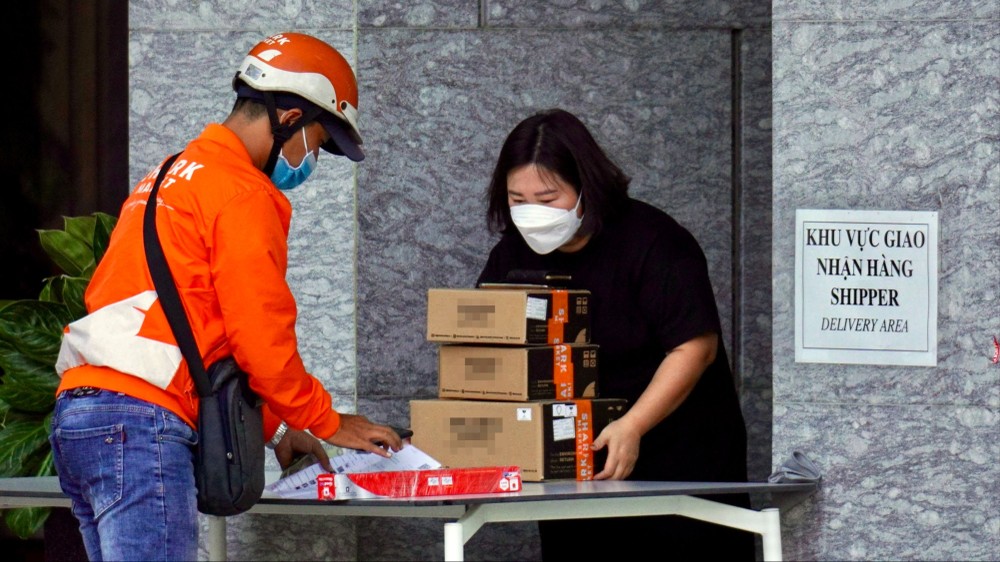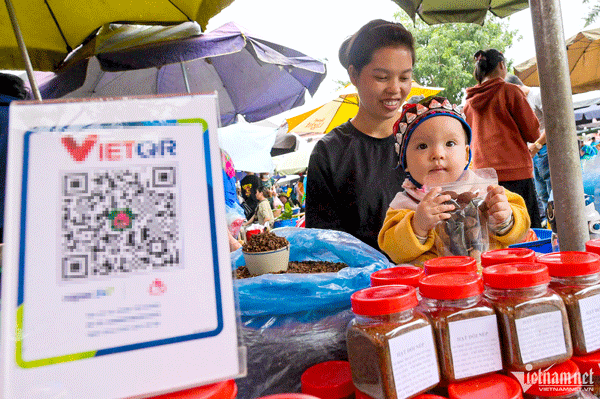This disparity has persisted for years, and an effective solution to boost local platforms has yet to be found.

The “money-burning” race
Every morning, Nguyen Duc Chi, a resident of District 3, Ho Chi Minh City, browses various e-commerce platforms for deals. Chi finds that foreign platforms offer particularly attractive and diverse products, making them hard to resist. “My family makes dozens of purchases on Shopee each month. They have many ways to keep customers, like offering refunds within 24 hours if you’re unsatisfied with a product. Their ads are everywhere. Their good service quality, frequent promotions, and competitive pricing are undeniable,” Chi noted.
Similarly, Mai Thu Lua from District 7 remarked that foreign e-commerce platforms offer a wide variety of trendy clothing at affordable prices, making purchases easy and tempting—an advantage over domestic platforms.
Recently, newcomers like Temu, Shein, and Taobao have entered the Vietnamese market, gaining attention with highly attractive discounts. According to business insiders, this trend is part of a “money-burning” competition. Tiki’s ongoing struggle, even after 14 years of operation, illustrates the challenge. VNG invested approximately VND384 billion into Tiki in early 2016, acquiring a 38 percent ownership stake. However, this share gradually declined, and within just a few years, the investment was almost depleted due to accumulated losses. Sendo, another local platform founded 12 years ago by FPT Online, faces similar difficulties. According to FPT Online's mid-2024 financial report, its investment in Sen Do JSC now stands at just over VND3.68 billion, representing a 3.29 percent ownership and voting stake. Data from Vietdata shows that in 2023, Sendo achieved nearly VND290 billion in net revenue but faced a post-tax loss of VND450 billion.
Estimates from industry insiders indicate that capturing just 1 percent of the e-commerce market share requires a minimum investment of US$6 million per year. This poses a huge pressure for startups currently seeking funding. In contrast, foreign e-commerce platforms continue to thrive and compete effectively in the Vietnamese market, largely due to substantial support from their parent companies.
Protecting consumers and addressing tax loopholes
Mrs. Le Hoang Yen, Chairwoman of the Board of Directors of Tatinta JSC (which operates the Tatinta travel platform), emphasized that, given the vigorous competition from foreign e-commerce platforms, businesses must find ways to “coexist” and establish their own unique strategies. However, she pointed out that the government needs to implement more specific policies to protect the rights of consumers and legitimate businesses. This includes closely monitoring imported goods from e-commerce platforms that fail to comply with Vietnamese regulations and increasing consumer awareness about the risks associated with cross-border online shopping.

According to the Ministry of Industry and Trade, e-commerce activities in Vietnam are experiencing significant growth and nationwide coverage, but this expansion has also led to an increase in violations across all 63 provinces and cities. Mr. Nguyen Duc Le, Deputy Director of the Department of Market Surveillance Operations – Vietnam Directorate of Market Surveillance, noted that individuals are exploiting loopholes in the transportation of goods to mix illegal products with legitimate shipments, thereby evading inspections by authorities.
Recently, local enforcement agencies have uncovered and addressed numerous violations related to goods sold through e-commerce, particularly involving counterfeit items and those lacking invoices or proper documentation. Notably, many of these violations have occurred on e-commerce platforms, as well as on social media sites, such as Facebook, Zalo, and TikTok. Regulatory agencies estimate that hundreds of billions of Vietnamese dong in tax revenue have been lost due to unreported sales or goods of unclear origin that have been smuggled into the market.
Mr. Dao Duy Tam, Deputy Director of the Customs Control and Supervision Department, asserts that managing e-commerce transactions requires a robust information technology system, as well as adherence to international standards and regulations regarding import and export taxes. Meanwhile, Mr. Bui Trung Kien, Vice Chairman of the Vietnam E-commerce Association (VECOM), recognizes that the rapid growth of e-commerce necessitates a strong legal framework to protect the rights of all stakeholders involved. However, he emphasizes that regulations must ensure consistency across electronic customs declaration processes, tax reporting, payment systems, and quality control of goods. The management framework should facilitate participation while also enforcing compliance with intellectual property protection and measures against cross-border trade fraud.
According to data from the General Department of Customs and the E-commerce Data Platform in Vietnam (Metric), Vietnam ranked among the top ten countries with the fastest e-commerce growth globally in 2023, achieving a total revenue of nearly VND498.9 trillion. Of this, major platforms like Shopee, Lazada, Tiki, Sendo, and TikTok Shop contributed VND233.2 trillion. Forecasts for 2024 indicate that revenue from these five platforms will reach VND301.3 trillion (approximately $12.4 billion). By 2025, the total revenue of Vietnam's e-commerce market is expected to reach VND947.7 trillion, equivalent to $39 billion.
























